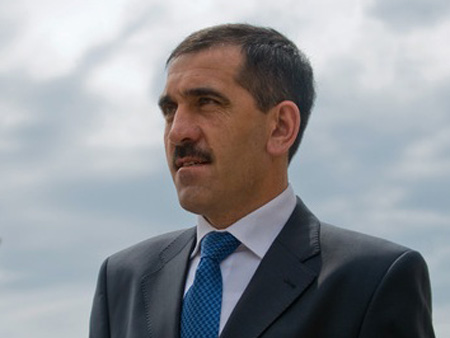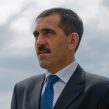
Apparently Eying Another Term, Yevkurov Launches PR Campaign
Publication: Eurasia Daily Monitor Volume: 9 Issue: 224
By:

The end of November was packed with events for the head of the small North Caucasusian republic of Ingushetia. On November 22–23, Yunus-Bek Yevkurov visited Kazakhstan, where he met people from the local Ingush diaspora. The Ingush diaspora came to existence in Kazakhstan following the deportation of the Ingush and Chechen peoples from the North Caucasus by Joseph Stalin in 1944. During his talks with the Ingush of Kazakhstan, Yevkurov tried to convince them that there were no obstacles from the authorities for their return to Prigorodny district, the disputed area between Ingushetia and North Ossetia (https://wordyou.ru/v-islame/evkurov-posetil-ingushskuyu-mechet-astany.html).
Yevkurov presented some business projects in Kazakhstan that attracted no interest from Kazakhstani companies, which are fairly well aware of the violent situation in Ingushetia. He then made an unexpected trip to Belgium on November 25–26, concerning the same business projects (www.habar.org/?p=17957). With the assistance of the Russian authorities, an event dedicated to the 20th anniversary of the creation of the Ingush republic in the Russian Federation was organized in Belgium (www.kp.ru/online/news/1304517). The unofficial purpose of the program was to change the Belgian public and political elite’s view of the North Caucasus in general and Ingushetia in particular (https://ingushetiyaru.org/news/35840/). Needless to say, the event generated practically no response. Yevkurov’s business projects also appeared to be out of touch with reality, as no Belgian business person attended the presentation (www.angusht.com/index.php?news=71693). The Ingush diaspora in Belgium was alarmed by Yevkurov’s visit, but did not try to obstruct the visiting Ingush officials. This diaspora community consists of people who were forced to leave the republic because of persecution by the current government (https://inglifenews.ru/index.php?option=com_content&view=article&id=2813:kavkaz&catid=1:news). Yevkurov himself denied political persecution in Ingushetia and expressed the hope for close cooperation with the Ingush residing in Europe (https://ria.ru/society/20121125/912153472.html). However, in an interview with local TV channels, Yevkurov could not hold back his resentment and said that many of the Ingush who came to Belgium are economic refugees and bandits—fugitives from Russian justice (https://slonus2012.livejournal.com/).
On November 27, immediately after his arrival back in Ingushetia, Yevkurov went to Chechnya for the first time in the past year. The head of Ingushetia personally expressed his condolences to Ramzan Kadyrov for the death of his grandmother, Diki Kadyrova (https://www.ingushetia.ru/m-news/archives/017596.shtml). This visit is very significant and may be the first sign of reconciliation between the two republican heads. Their public row throughout 2012 became the subject of many reports by the media, which transmitted their multiple mutual insults with alacrity. Such a feud between two regional leaders is hard to imagine in any other part of the Russian Federation.
Yevkurov then traveled to Moscow, where he suddenly got highly involved in religious affairs. Following the Chechen lead, the Ingush businessman Bashir Kodzoev managed to convince Saudi authorities to donate a hair from the beard of the Prophet Muhammad to the Ingush people (https://ingushetiyaru.org/news/35854/). Following the Chechen way of doing such things, the head of Ingushetia also decided to hold a solemn ceremony for welcoming this valuable relic to the republic. Ingushetia’s government even created a commission for the sole purpose of organizing the ceremony (www.galga.ru/news/2012-12-01-2719). Everything was going well until suddenly the well-known Chechen official Adam Delimkhanov brought several hairs of the Prophet Muhammad to Ingushetia from Chechnya at the personal request of Ramzan Kadyrov (Chechen TV news, December 3). The move took Ingushetia’s leadership, which was in Moscow at the time, by surprise. Indeed, the stunt was an attempt by the Chechen authorities to undermine the Ingush leadership’s triumphant ceremony and bolster Kadyrov’s image at Yevkurov’s expense.
All these events and visits by Yevkurov look strange for an unpopular leader whose rating, according to the opposition, is barely above zero (www.ri-online.ru/index.php/2009-11-07-18-20-51/4099-pochemu-evkurov-xochet-possorit-ingushej-i-chechenczev). However, the purpose of the Ingush leader’s activities soon became known, when Ingushetia’s representative in the Council of Federation, Nikita Ivanov, said he would run for a seat in the Council if “Yunus-Bek Yevkurov decided to run for the office of the head of the republic.” Elections for the head of Ingushetia are set for September 2013. Previously, the head of the republic was appointed by the Russian president. Hinting that Yevkurov would indeed run for another term as head of Ingushetia, Ivanov added: “This is almost [like the] American electoral system in which the head of the republic nominates the people who will run with him” (www.kommersant.ru/doc/2077440). So Yevkurov’s PR visits to Europe and Kazakhstan and his organizing the arrival of the sacred relic to Ingushetia fit together as the start of his electoral campaign.
However, the opposition in Ingushetia is determined to thwart Yevkurov’s plans and remove him from office even before his term ends (www.georgiatimes.info/articles/81379.html). Yevkurov’s statements about outlawing hijab in the republic’s schools will be held against him by the Muslim part of Ingushetia’s population, which is quite large (www.rg.ru/2012/10/27/reg-skfo/evkurov-anons.html). Ingushetia’s residents are also unlikely to forgive Yevkurov’s statements about the disputed district in North Ossetia (www.angusht.com/basic_materials/index.php?news=23345). And they are even less likely to forgive Yevkurov for the many killings of young people in the republic (www.ri-online.ru/index.php/2009-11-07-18-24-34/4245-kto-ubivaet-lyudej-v-ingushetii-video).
However, since there are no free and fair elections in Russia, the vote is almost always won by someone who is supported by the government. This means that even with a zero rating, Yevkurov has a chance to be “elected,” although it is unclear why the Kremlin would need someone like him, who provokes negative emotions among a majority of the population in an unstable region. The Kremlin reportedly would like to install in the republic a new person, and the search for a replacement has been underway among the Ingush diaspora in Moscow for the past two years.
Whatever happens, it is unlikely that Moscow will support Yevkurov’s candidacy blindly. Instead, the central government will likely put forward a successful Ingush business type person who will be happily accepted by the local population. Thus, the remaining nine months before the elections in Ingushetia will evidently not be a period of peace and quiet in the republic.




